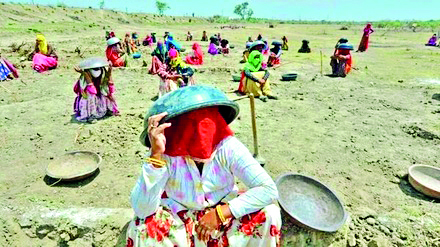Govt, under fire over MGNREGS enrolment drop, says no fixed targets for demand-driven scheme

NEW DELHI: The government on Sunday dismissed reports suggesting that enrolment under the Mahatma Gandhi National Rural Employment Guarantee Scheme (MGNREGS) is declining, noting that it is not possible to set targets for total enrolment in this demand-driven scheme as the financial year is still ongoing.
According to a report by LibTech India on MGNREGS implementation, there has been an 8 per cent drop in the number of active workers under the scheme compared to last year.
Fewer people participated in MGNREGS during the first six months of this financial year (April-September) compared to the same period last year, a recent analysis by LibTech indicated. The report added that the net deletion of worker names from the list of registered workers stood at around 39 lakh during this period.
The analysis showed that while 85 lakh workers were removed, only 45 lakh were added to the list of registered MGNREGS workers, resulting in a net deletion of 39 lakh. The report also raised concerns about wrongful deletions.
“Since MGNREGS is a demand-driven scheme and the current financial year is still ongoing, it is not possible to set an exact target for person-days generation.
However, the states/UTs may submit proposals for labour budget revisions based on locally identified needs,” the Rural Development Ministry said in a statement.
“It should be noted that the total person-days generated between FY 2006-07 and FY 2013-14 was 1,660 crore, whereas the total person-days between FY 2014-15 and FY 2024-25 has been 2,923 crore,” it added.
The LibTech report highlighted a significant decline in employment opportunities under the scheme, from 184 crore to 154 crore person-days compared to the previous year.
The report also stated that 27.4 per cent of all workers, or 6.7 crore people, are ineligible to receive wages through the Aadhaar-Based Payment System (ABPS).
LibTech describes itself as a team of engineers, social workers, and social scientists focused on improving public service delivery in India.
The report, titled “MGNREGA Implementation in India: Insights and Trends, April-Sept 2024,” released on Friday, argued that the central government’s push for Aadhaar-based payment coupled with the states’ alleged failure to address erroneous deletions has worsened the issue.
On direct benefit transfer (DBT) and Aadhaar seeding, the ministry described ABPS conversion as a major reform ensuring benefits are credited directly into workers’ bank accounts based on their Aadhaar numbers under MGNREGS.
“As of October 26, 2024, Aadhaar seeding has been completed for 13.1 crore active workers, covering 99.3 per cent of total active workers (13.18 crore),” the ministry said.
“It is incorrect to claim that workers’ demand for work goes unregistered if their accounts are not ABPS-enabled or that their wages remain unpaid for this reason. For workers pending ABPS, states/UTs have been urged to coordinate with banks to ensure timely Aadhaar seeding into the NPCI mapper for MGNREGS beneficiaries,” it added.
The ministry clarified that any transaction rejected by the National Payments Corporation of India (NPCI) or a bank under ABPS can be reprocessed through the National Automated Clearing House (NACH) payment mode.
“An alternative solution exists within NREGASoft, using the NACH payment mode (account-based) for reprocessing failed transactions under ABPS. States/UTs are regularly advised on this,” the ministry said.
On job card deletions, the ministry explained that job card verification is an ongoing process under MGNREGS, conducted by states and UTs using the Aadhaar number as a tool for de-duplication.
“Job cards can be cancelled or deleted after due verification only if they are found to be fake, duplicate, or if the household is unwilling to work, has permanently relocated from the gram panchayat, or in the case of single-person households where the individual has passed away,” the ministry stated. The ministry reported that in FY 2023-24, states deleted a total of 1.02 crore job cards, while in the current FY 2024-25, as of October 26, 32.28 lakh job cards have been deleted.
The ministry also rejected claims that MGNREGS work is hindered in villages where frontline supervisors, or “mates,” lack smartphones compatible with the NMMS app. “In cases where attendance cannot be uploaded due to exceptional circumstances, the District Programme Coordinator (DPC) is authorised to approve manual attendance. In FY 2024-25, attendance for 20.35 lakh worksites (95.66 per cent) has been recorded and uploaded on the portal,” the ministry said.
It added that the scheme’s budget has been on an upward trend, with FY 2024-25 witnessing the highest allocation since MGNREGS’ inception. The budget increased from Rs 33,000 crore in FY 2013-14 to Rs 86,000 crore in FY 2024-25, and the minimum average wage rate rose by 7 percent in FY 2024-25.
Meanwhile, Congress leader Jairam Ramesh accused the Modi government of “systematically undermining” MGNREGS and called for a budget increase, calling it the “lifeline” of millions of India’s poorest communities.
“MGNREGS—the lifeline for crores of India’s poorest—is being systematically undermined by the PM’s government. Budget allocations are being consistently cut, wage rates remain stagnant, and now, with excessive reliance on technology, workers are being denied their right to work and fair payment,” Ramesh said in a statement on Saturday.
The Congress leader, a former Union rural development minister under the UPA government, added that in January 2024, the Rural Development Ministry mandated nationwide Aadhaar-Based Payment System (ABPS) implementation for MGNREGS.
To be eligible for ABPS, workers must meet several criteria, including linking their Aadhaar to their job cards with matching names, and mapping the Aadhaar-linked bank account with the National Payments Corporation of India, he explained. “Ten months later, we now have data on the disastrous impact of this policy shift,” he alleged.
According to an analysis of public data from the MGNREGS portal by LibTech, 27.4 per cent of all registered workers (6.7 crore) and 4.2 per cent of active workers (54 lakh) remain ineligible for ABPS, Ramesh claimed.



